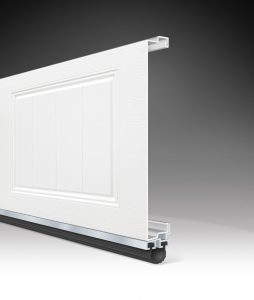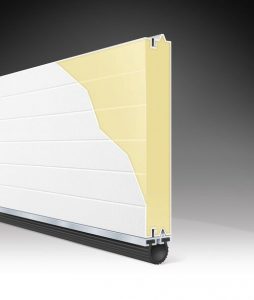Insulated vs. Non-Insulated Garage Doors: Exploring the Key Differences and Benefits
Garage doors provide security, convenience, and aesthetic appeal. When it comes to selecting the right garage door, one needs to determine whether to opt for an insulated or non-insulated garage door. Here’s a brief article to give you a good idea of what each type do and how they can benefit your home.
What are Non-Insulated Garage Doors?

Non-insulated garage doors, as the name suggests, lack the additional layer of insulation found in their insulated counterparts. These doors are typically constructed with a single layer of steel or aluminum, making them more affordable and suitable for specific situations.
These are a viable option in moderate or warm climate regions where extreme temperatures are not a significant concern. If you live in an area with mild winters and hot summers, the additional insulation may not be necessary to maintain comfortable conditions within your garage.
Cost is often a determining factor for many homeowners when choosing a garage door. Non-insulated doors tend to be more budget-friendly compared to insulated ones. If you have limited funds or your garage is detached from your living spaces, a non-insulated garage door can still provide adequate functionality and security without breaking the bank.
What are Insulated Garage Doors?

Insulated garage doors are designed with an additional layer of insulation, which helps regulate temperature and provide various benefits compared to their non-insulated counterparts. The insulation material, often polyurethane or polystyrene, is sandwiched between layers of steel or other durable materials. This insulation helps reduce heat transfer, keeping your garage cooler in the summer and warmer in the winter.
This type of garage doors offer several advantages worth considering. First and foremost, they provide improved energy efficiency, resulting in potential cost savings over time. By minimizing the exchange of heat between the inside and outside of the garage, they help maintain a more stable temperature, reducing the strain on heating and cooling systems. This translates into lower energy bills and a greener footprint.
Noise reduction is another significant benefit of insulated garage doors. The insulation material acts as a sound barrier, muffling external noises such as street traffic, barking dogs, or construction sounds. This can be particularly advantageous if your garage is adjacent to living spaces or if you use the garage as a workshop or recreational area, where a quieter environment is desired.
Furthermore, insulated garage doors tend to be more durable and have a longer lifespan compared to non-insulated doors. The insulation layer provides added structural strength, making the door more resistant to dents, warping, and damage caused by external factors. This durability ensures that your investment in an insulated garage door will provide long-term value.
Additionally, the insulation in these doors helps regulate the temperature inside the garage. Whether it’s sweltering heat or frigid cold outside, an insulated garage door helps maintain a more comfortable and consistent temperature within the garage. This can be particularly beneficial if you have items stored in the garage that are sensitive to extreme temperatures, such as electronics, paint, or delicate materials.
When to Consider Insulated Garage Doors

While insulated garage doors offer numerous advantages, there are specific situations where they are particularly beneficial. If you reside in a cold climate region, where harsh winters are common, an insulated garage door can make a significant difference in maintaining a comfortable temperature within the garage and reducing heat loss to the outside.
Similarly, if you have living spaces above the garage or an attached garage, investing in an insulated door is highly recommended. The insulation helps prevent temperature fluctuations, ensuring that the rooms above the garage stay cooler in the summer and warmer in the winter. This creates a more comfortable living environment and reduces the load on your home’s heating and cooling systems.
Moreover, if you use your garage as a workshop, gym, or entertainment area, an insulated garage door provides a more pleasant and quiet space. The insulation material effectively dampens noise, allowing you to focus on your projects or enjoy recreational activities without disturbances from the outside world or vice versa.
Situations Where Non-Insulated Garage Doors are Suitable
Non-insulated garage doors are well-suited for specific scenarios. If you reside in a moderate or warm climate region with no extreme temperature fluctuations, a non-insulated door can adequately serve its purpose. These doors are often found in garages that are not directly attached to the main living areas, such as standalone garages or those situated away from the house.
Moreover, if budget constraints play a significant role in your decision-making process, opting for a non-insulated garage door can help you save money upfront. While they may not provide the same energy efficiency and noise reduction benefits as insulated doors, non-insulated doors still offer security, functionality, and an attractive appearance without the added expense of insulation.
Factors to Consider When Choosing Between The Two
To determine the most suitable type of garage door for your needs, consider the following factors:
- Climate and weather conditions: Assess the climate in your region and consider the temperature fluctuations throughout the year. If you experience extreme temperatures or significant variations, insulated garage doors are highly recommended.
- Intended use of the garage: If you use your garage for activities that require a quieter and more comfortable space, such as a workshop, gym, or recreational area, insulated doors provide superior noise reduction and temperature regulation.
- Budget considerations: Evaluate your budget and determine how much you are willing to invest in a garage door. Insulated doors are generally more expensive than non-insulated ones due to the added insulation material.
- Long-term cost savings: While insulated garage doors may have a higher upfront cost, they offer potential long-term energy savings and increased durability, which can outweigh the initial investment.
By carefully considering these factors, you can make an informed decision that aligns with your specific requirements and budget.
To Recap
Choosing between insulated and non-insulated garage doors is a decision that should be based on your unique circumstances and priorities.
Insulated doors offer superior energy efficiency, noise reduction, durability, and temperature regulation, making them an excellent choice for colder climates, attached garages, and spaces where a quieter environment is desired.
Non-insulated doors, while lacking these additional benefits, can still provide functionality and security at a more affordable price, particularly in moderate or warm climate regions and detached garages. By weighing the pros and cons and considering factors such as climate, usage, budget, and long-term cost savings, you can select the garage door that best suits your needs.
FAQs
1. Can I add insulation to my existing non-insulated garage door?
Yes, it is possible to add insulation to an existing non-insulated garage door. Retrofit insulation kits are available in the market, allowing you to add insulation panels or foam boards to the interior of the door. While this may improve the insulation properties to some extent, it is not as effective as having a door specifically designed with insulation.
2. Are insulated garage doors more secure than non-insulated doors?
The insulation in garage doors does not significantly impact their security. Both insulated and non-insulated doors can provide adequate security if they are properly constructed and have sturdy locking mechanisms in place. The level of security primarily depends on the quality of the door, its materials, and the locking system.
3. Are there any downsides to insulated garage doors?
One potential downside of insulated garage doors is their higher initial cost compared to non-insulated doors. Additionally, insulated doors tend to be heavier due to the added insulation material, which can place more strain on the garage door opener and require a more robust opener system.
4. Do insulated garage doors require special maintenance?
Insulated garage doors typically do not require any special maintenance beyond regular cleaning and lubrication of the moving parts. It is advisable to follow the manufacturer’s guidelines for maintenance and perform routine inspections to ensure the door is functioning properly.
5. Can insulated garage doors increase the value of my home?
Installing an insulated garage door can enhance the value of your home. Potential buyers appreciate the energy efficiency and comfort benefits that come with an insulated door. It is considered a desirable feature and can make your property more attractive in the real estate market.
6. Are insulated garage doors worth the investment?
Yes, insulated garage doors are worth the investment for many homeowners. They offer benefits such as improved energy efficiency, temperature regulation, soundproofing, durability, and overall comfort. The cost savings on energy bills and potential long-term durability outweigh the higher upfront cost.
7. Can I install an insulated garage door myself?
While it’s possible to install an insulated garage door yourself, it’s generally recommended to hire professionals for installation. They have the necessary expertise, tools, and experience to ensure proper alignment, balance, and safe operation of the door.




